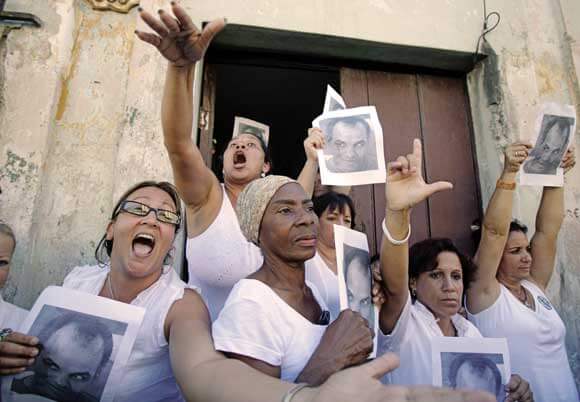Cuban security officials on Feb. 23 detained dozens of protesters and put several under house arrest as nationals marked the anniversary of the death of dissident Orlando Zapata Tamayo.
Zapata Tamayo died on Feb. 23 last year after a long hunger strike protesting prison conditions.
“We managed to get to the cemetery despite a big police deployment,” Reina Luisa Tamayo, Zapata Tamayo’s, mother told reporters.
“We prayed, put flowers, observed a minute of silence and shouted ‘Zapata Lives!’”
Elizardo Sanchez Santa Cruz, a human rights activist here said about 45 dissidents were detained on Feb. 23 and nearly 60 confined to their homes in what he described as “a wave of preventive repression.”
Cuban security officials regularly detain dissidents to keep them from attending opposition gatherings, and release them hours or days later.
Guillermo Farinas – who became one of Cuba’s best-known dissidents when he launched his own hunger strike, one day after Zapata Tamayo’s death, to press for the release of 26 political prisoners – was among those under house arrest.
Berta Soler, one of the leaders of the “Ladies in White” dissident group, said 13 members of the group had managed to gather at the home of another leader, Laura Pollan, despite security officials’ attempts to intercept members heading there.
Pollan said officials also visited other members at home, warning them that they could jeopardize the government’s ongoing process of releasing political prisoners if they joined the anti-government protests planned for Feb. 23.
Over the last weekend, the Roman Catholic Church said that the Raul Castro administration had agreed to free seven more political prisoners.
The archbishop’s office in Havana said six of the prisoners, who were charged with crimes against state security, would be exiled in Spain, while the seventh will remain in Cuba.
It said the six prisoners released on Saturday and will be sent to Spain are: Roger Cardoso, Yoan José Navalon, Yosnel Batista, Juan Antonio Bermudez, Marco Antonio Zayas and Reinier Concepción.
The archbishop’s office said Ivan Hernández, an independent journalist, has refused exile.
Hernández was among 75 people arrested by Cuban authorities in a crackdown on dissidents in 2003 for allegedly working with the United States in undermining Cuba’s communist system. They have denied the charge.
Just over two weeks ago, Cuban authorities released from jail Hector Maseda and Angel Moya, two popular dissidents, who had requested their continued detention until other opposition leaders were freed.
The Castro administration had agreed to release Moya a week before, but he had refused, stating that he had preferred ailing dissidents to be set free first.
Maseda had also declined his early release, urging that he be granted pardon rather than parole.
But prison authorities said that they could no longer keep them jailed.
Since 2003, The “Ladies in White” have marched peacefully each Sunday through the streets of Havana.
In July, the Cuban government pledged to release all remaining dissidents from the 2003 crackdown.
All but one of the 41 released shortly after the announcement went into exile in Spain, along with their families.























